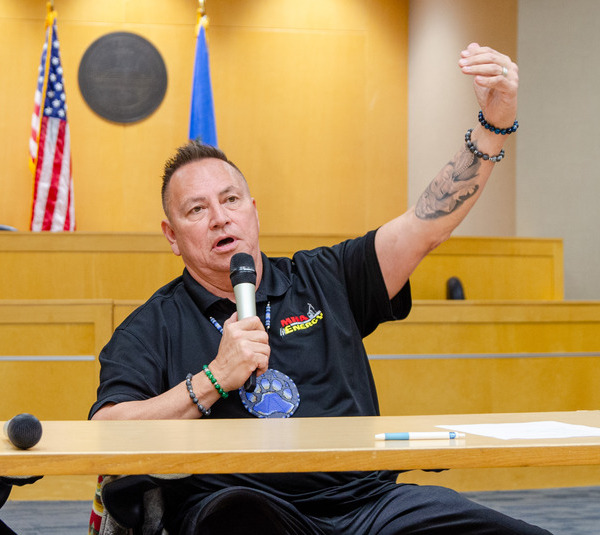 The University of Tulsa’s College of Law recently hosted a Sustainable Energy and Resource Law (SERL) conversation about energy on tribal lands. TU Associate Professor of Law Warigia Bowman, director of the Sustainable Energy and Natural Resources Program, led the conversation, along with Professor of Law Marc Roark.
The University of Tulsa’s College of Law recently hosted a Sustainable Energy and Resource Law (SERL) conversation about energy on tribal lands. TU Associate Professor of Law Warigia Bowman, director of the Sustainable Energy and Natural Resources Program, led the conversation, along with Professor of Law Marc Roark.
“Energy on tribal lands represents an opportunity, but it also brings up dark, historical memories,” Bowman said. She pointed out that the Oscar-winning film Killers of the Flower Moon reminds people of a time when white Oklahomans managed the Osage peoples’ finances and, more disturbingly, murdered Osage members for their oil wealth.
“Any discussion regarding energy on tribal lands has to respect the history of suspicion and caution, which Native Americans communities may view when they think about the development of energy on their nations,” Bowman explained.
This conversation featured two panelists who shared their perspectives on the matter, emphasizing the importance of gaining the support of Indigenous communities before developing energy in the United States, whether it be clean energy or fossil fuel energy. Tahlina Nofire (JD ’05) founded Nofire Law and Consulting. Her practice is solely dedicated to assisting tribal governments and their citizens, small Native American businesses, and companies that are doing business in Indian Country. She was also recently appointed the attorney general for Ponca Nation.

“I got my certificate in federal Indian law because that’s all I wanted to do,” said Nofire.
She explained that during her 18-year career, she’s benefited from working for both tribes and private businesses.
“One of the things that you have to remember when negotiating is that the tribes all have their different cultures,” said Nofire. “You have to be familiar with the way they operate. They all have their different codes, they all have different contract clauses that they are very partial to. Whether you’re representing a tribe or private company, it’s very important to know how that dynamic works.”

Travis Hallam traveled from North Dakota to join the panel. After working with pipelines as an operator and emergency rescue technician for nearly 30 years, he transitioned to the Mandan, Hidatsa, and Arikara (MHA) Nation as a pipeline authority to establish regulations for responsible development of pipelines.
“The legal system has never really protected us very well, and we’ve all suffered through that,” Hallman said.
In North Dakota, the MHA Nation (also known as the Three Affiliated Tribes) is located on the Fort Berthold Indian Reservation, which Hallman explained is extremely profitable land that has experienced a vast number of gathering line releases. He said he was hired to establish a pipeline code for the MHA Nation after 1.3 million gallons was spilled. He says his pipeline program brought that down to zero gallons spilled, making it the most successful program in the nation.
“We’ve become very good at fact-checking, doing our own research, setting our own standards,” Hallam said.
“Indigenous people from around the world are fighting to enforce their rights,” Bowman explained.
This event ended with a question-and-answer session with TU Law students and alumni.
“While TU offers a wide array of legal classes, including Native American Natural Resources, we very rarely get to hear the tribal perspective. Hearing the tribal perspective is necessary to understanding practical impacts of the work we are being trained for,” said Randy Knight, president of TU’s Native American Law Student Association. “I hope we have more events like this in the works.”






